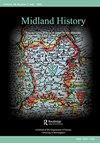Stories from the Herefordshire Suffrage Campaign
IF 0.1
Q3 HISTORY
引用次数: 0
Abstract
anyone interested in the local history of Staffordshire and its great country estates. Perhaps appropriately for a book published by the Staffordshire Record Society, only seven pages cover Swynfen’s time representing the Dorset constituency of Bridport from 1837–41, ostensibly as a ‘reformer’ and supporter of the Whig ministry. Swynfen’s hugely embarrassing public exposé of the Whig government’s ‘whipping’ system gets ample coverage. His controversial letters in the press – defending his rebel votes against ministers or his refusal to help finance a local church – are also examined, alongside his public pledge to compensate any of his tenants if they suffered financially from the abolition of the corn laws. Clearly an oddball, Swynfen was that ultrarare creature, a landowner who had inherited vast family estates but who held extreme radical opinions. Perhaps more could have been said about the way his traumatic childhood might have shaped his politics. If, as suggested (p. 32), his upbringing influenced his decision to demolish the old family seat of Darlaston Hall, or his disposal of all the family portraits, then it might also help explain his rejection of other traditional values. Nothing is said about how or why he came to represent a shipping port. Perhaps Bridport’s reputation for venality was a factor, enabling him to simply buy the seat. More could also have been mentioned about his other political activities, such as his committee work or presentation of petitions. The main focus and merit of this volume, though, is the way it manages to reconstruct Sywnfen’s wide-ranging social, theatrical and literary pursuits and his various business roles and cultural interests, rescuing this ‘eccentric’ polymath from obscurity. The circles he and his family moved in included luminaries such as Charles Dickens, Charles Babbage, William Thackeray and Leigh Hunt. Thomas Carlyle, never one to mince his words, dismissed him as a ‘wretched dud’ and a ‘dirty little atheistic radical’ full of ‘pretentious twaddle’. The pre-Raphaelite, Dante Gabriel Rossetti, however, revered him as ‘a very cultivated scholar’. Swynfen’s lasting legacy was his Dictionary of the Language of Shakespeare, published posthumously and still in print. But as this quirky account of his life and family reveals, there was so much more to him than this.赫里福德郡选举权运动的故事
任何对斯塔福德郡及其伟大乡村庄园的当地历史感兴趣的人。也许对于斯塔福德郡记录协会出版的一本书来说,只有七页的篇幅涵盖了斯温芬在1837年至41年间代表布里德波特多塞特选区的时期,表面上是辉格党部的“改革者”和支持者。Swynfen对辉格党政府“鞭笞”制度的公开揭露非常尴尬,得到了充分的报道。他在媒体上发表的有争议的信件——为他的反叛分子投票反对部长或拒绝帮助资助当地教堂辩护——也受到了审查,同时他公开承诺,如果他的任何租户因废除玉米法而遭受经济损失,他将赔偿他们。Swynfen显然是个怪人,他是一个极其罕见的生物,一个继承了大量家族财产但持有极端激进意见的土地所有者。关于他痛苦的童年可能塑造了他的政治,也许还有更多的话要说。如果正如所暗示的那样(第32页),他的成长影响了他拆除达拉斯顿大厅旧家族所在地的决定,或者他对所有家庭肖像的处理,那么这也可能有助于解释他对其他传统价值观的排斥。没有说明他是如何或为什么来代表一个航运港口的。也许布里德波特贪污的名声是一个因素,使他能够简单地购买这个席位。关于他的其他政治活动,比如他的委员会工作或请愿书的提交,也可以提到更多。然而,这本书的主要焦点和优点在于,它成功地重建了Sywnfen广泛的社会、戏剧和文学追求,以及他的各种商业角色和文化兴趣,将这位“古怪”的博学者从默默无闻中拯救出来。他和家人的圈子包括查尔斯·狄更斯、查尔斯·巴贝奇、威廉·萨克雷和利·亨特等名人。托马斯·卡莱尔从不含糊其辞,他认为他是一个“可怜的家伙”和一个“肮脏的小无神论激进分子”,充满了“做作的废话”。然而,拉斐尔前派丹蒂·加布里埃尔·罗塞蒂(Dante Gabriel Rossetti)尊他为“一位非常有修养的学者”。Swynfen的不朽遗产是他的《莎士比亚语言词典》,该词典在他死后出版,至今仍在印刷中。但正如这篇关于他的生活和家庭的离奇报道所揭示的那样,他还有更多的东西。
本文章由计算机程序翻译,如有差异,请以英文原文为准。
求助全文
约1分钟内获得全文
求助全文

 求助内容:
求助内容: 应助结果提醒方式:
应助结果提醒方式:


